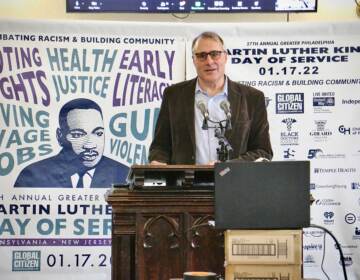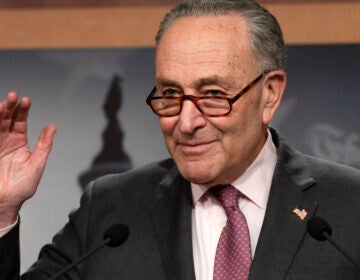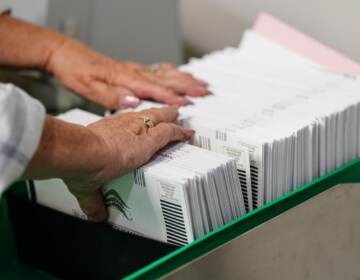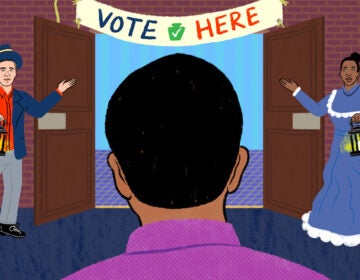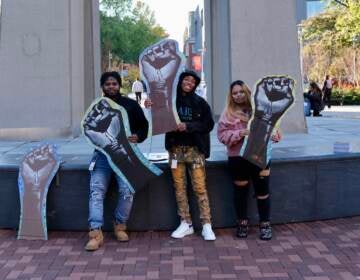Equal access and equal voices: The eternal relevance of MLK’s ‘Give Us the Ballot’ speech
Equal voices and equal access continue to be more of a war to be waged than rights to be mutually shared, writes Rev. David Brown.
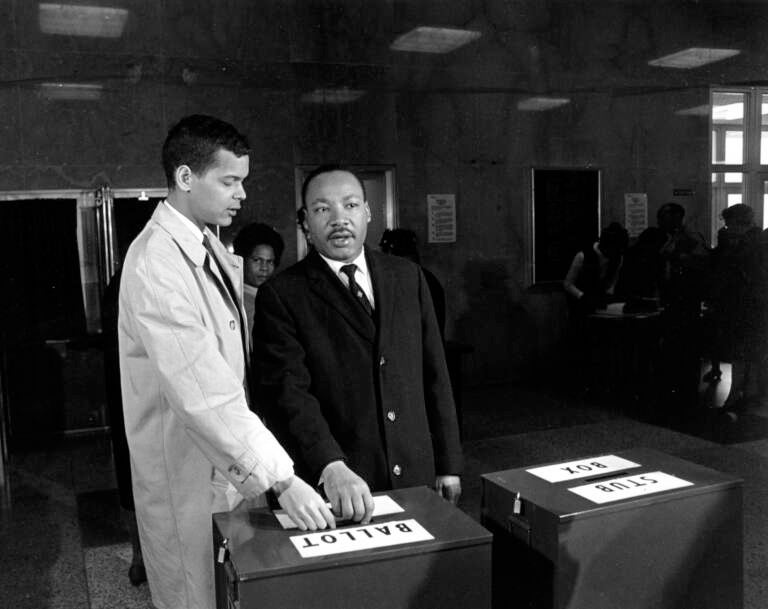
A photo of Julian Bond and Dr. Martin Luther King Jr. casting their ballots to fill Bond's vacant seat in the U.S. House of Representatives in Atlanta, Ga., on Feb. 23, 1966. (AP Photo)
For many of us, fighting for equal rights is a lifelong battle. Even when court decisions are made and legislation is passed that advances the cause, the fight over how to enact those same rights and privileges happens before the very ink is dry.
In 1954, the U.S. Supreme Court ruled in the landmark Brown v. Board of Education case that separate facilities were inherently unequal. But the verdict also dictated that dismantling these racist practices would be left up to the states to undo.
So when Rev. Dr. Martin Luther King Jr. delivered his “Give Us the Ballot” speech in 1957, it was done so at a time when the country was moving at a glacial pace to right the wrongs of its shameful legacy.
Even as Dr. King and his civil rights allies were winning one hard-fought battle, they were fighting states’ efforts to limit African Americans’ access to the ballot. By imploring legislators to “Give Us the Ballot,” King’s speech was simple but persistent in demanding equal access and voices.
King said: “We must work with determination to create a society, not where Black men are superior and other men are inferior and vice versa, but a society in which all men will live together as brothers and respect the dignity and worth of human personality.”
Equal voices and equal access continue to be more of a war to be waged than rights to be mutually shared. That war was on full display a little more than a year ago, when thousands of people stormed the Capitol on Jan. 6 in a demonstration that ended in destruction, anarchy, and death. In his time, King would masterfully use the symbols of Washington as a backdrop to illustrate the unfulfilled promise of America. The Capitol rioters chose to violate those symbols to reclaim rights that they never lost.
As a professor committed to making a difference in and outside of the classroom, I often look for teaching moments — even those born out of chaos — that can both instruct and inspire change. This violent date in history provided the perfect context for a lesson.
On the anniversary of the insurrection, I found myself in Washington with 20 Temple University students at the very spot where the riot sparked. The students had all enrolled in a course — designed by my fellow professors, Dana Saewitz, and Meghnaa Tallapragada — which taught them how to use communication skills to disrupt the types of systems that embolden the white supremacist acts that King fought against.
The course, entitled “Rocking the World: Disrupting Stereotypical Notions of Race, Class and Religion,” was built around Isabel Wilkerson’s award-winning book, “Caste: The Origins of our Discontents,” which explores how caste systems have historically operated (and continue to do so) across cultures, continents, and contexts that affect our lives today.
I learned as much as I taught.
The lessons were painful but necessary in grappling with some hard truths. I learned that King, who was inspired by the teachings of Mahatma Gandhi, was himself seen by those upper castes in India as one of the “untouchables” — the lowest rung of the American society he sought to reform. While he initially rejected that designation, King embraced his identity as the “American Untouchable” which enabled him to better understand the caste system as it was operating in the states and seek to destroy it brick by brick.
Wilkerson traces the origin of caste systems from where it’s been in place for centuries in India, to its manifestation in the U.S. throughout history, to how the Nazis used the tenets of caste to exterminate millions of Jews during the Holocaust.
The students were all required to read the book, participate in three full days of instruction, and then travel together to the nation’s capital for immersive experiences in the U.S. Holocaust Memorial Museum and the National Museum of African American History and Culture. We also made a pilgrimage to the King monument.
As instructors, we were admittedly a little nervous about what our students would encounter while in D.C. Throughout our stay, we were getting alerts and news flashes warning us of possible chaos. But sometimes you have to push past the warning signs to teach others how to navigate the kind of terrain that has kept so many “in their place” instead of “in their power.”
To their credit, our students never flinched. They dove into the challenging content they were required to master. They went boldly to any and all of the venues — even engaging folks who were openly hostile to both their questions and their curiosity.
They leaned into the discomfort — while pricking wounds that prompted tears, laughter, and a better understanding of what many others have sacrificed to allow them the privilege of becoming disrupters themselves. While all of the students will get a grade for their participation, the lessons learned will last a lifetime.
But learning a lesson is one thing. Putting what’s learned to work is really the measure that matters. The words that assert that all persons are created equal have motivated movements led by King and others for decades. If we allow those words to be detached from bold action, we will have failed to teach how to fight for the rights we all deserve.
Anything less would simply be incomplete.
___
David W. Brown is an assistant professor of instruction and serves as the diversity adviser to the Office of the Dean at Klein College of Media and Communication at Temple University.

Subscribe to PlanPhilly
WHYY is your source for fact-based, in-depth journalism and information. As a nonprofit organization, we rely on financial support from readers like you. Please give today.



